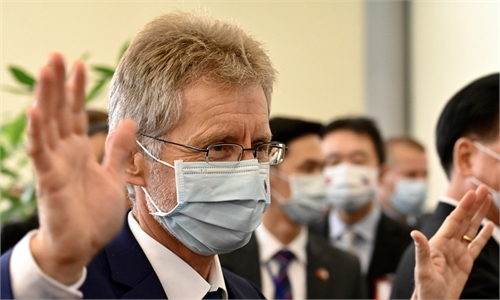SOURCE / INDUSTRIES
Vystrcil's visit clouds China-Czech economic ties

Photo taken on March 31, 2020 shows the view of the empty Old Town Square in Prague, the Czech Republic.Photo:Xinhua
Czech Senate Speaker Milos Vystrcil's visit to the island of Taiwan, a blatant violation of the one-China principle, has clouded the Central European na-tion's trade and investment ties with Beijing, regional affairs observers said on Tuesday.
The 17+1 initiative underpinning China's cooperation with 16 Central and Eastern European Countries (CEEC) and the China-proposed Belt and Road Initiative (BRI) could be leveraged to translate China's footprint in the CEEC into more tangible results, undercutting the mistaken approach to regional cooperation, they noted.
Vystrcil landed in Taipei on Sunday on a charter flight operated by Taiwan's China Airlines, making him the highest-ranking sitting Czech official to visit the island.
It is likely that such petty tricks are being employed as a bargaining chip for more benefits in trade and investment terms, Cui Hongjian, director of EU studies at the China Institute of International Studies in Beijing, told the Global Times on Tuesday.
But that tactic risks China hitting back, with China playing its economic card to prompt the correction of political wrongdoings on the Czech side, Cui said.
Chinese State Councilor and Foreign Minister Wang Yi on Monday criticized the visit to Taiwan, saying that any attempt to challenge the one-China princi-ple will have "a heavy price."
China-Czech trade rose 5.8 percent year-on-year to $14.37 billion in the first half of the year, accounting for 8.8 percent of the Central European nation's total trade, the Chinese Commerce Ministry said in August, citing preliminary data from the Czech Statistical Office.
The Czech Republic's exports to China shrank 5.8 percent year-on-year to $1.15 billion during the period, while its imports from China grew 7 percent to $13.22 billion, the data showed.
China has become the Czech Republic's second-largest trading partner and its largest trading partner outside the EU. China's actual outstanding invest-ment in the nation hit $2.4 billion and more than 50 Chinese businesses have invested there, creating over 6,000 jobs, according to a posting on the website of the Chinese embassy in Czech in late 2019.
Additionally, four direct air routes to Prague have opened in recent years, powering a nearly 30-percent annual rise in Chinese mainland tourist arrivals, the posting said.
There is very limited room for an economic team-up between the Central Eu-ropean economy and Taiwan, factoring in the tiny size of the island's economy — especially when compared with the Chinese economy as a whole, Cui commented.
Still, instead of wielding an economic weapon, it would make more sense for China to make the best of its involvement in regional cooperation mechanisms to fundamentally mute any "noises" that are amplified by the US' rising presence in the CEEC, said Zhu Xiaozhong, a research fellow with the Institute of East European, Russian and Central Asian Studies at the Chinese Academy of Social Sciences.
Chinese investment flows into the region have been impeded by the EU regulatory framework, stirring concerns over insufficient Chinese funding, particularly as the US continues to up the ante in the region with not only a military presence but with public infrastructure investment, Zhu told the Global Times on Tuesday.
More tangible projects under the BRI and the 17+1 initiative would serve as an economic stabilizer to maximize friendship between China and these na-tions, essentially thwarting the US attempt to undercut a more robust CEEC strategy toward China, he noted.

